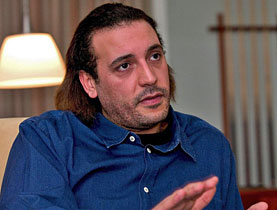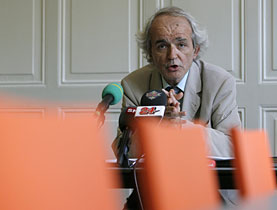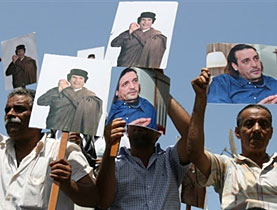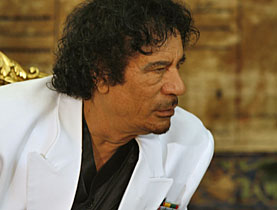Swiss continue dialogue to resolve Libya crisis

Relations between Switzerland and Libya continue tense a month after the arrest of Hannibal Gaddafi and his wife in Geneva.
Discussions are continuing between the two sides to solve the problem between them, but details still have to be negotiated, foreign ministry spokesman Jean-Philippe Jeannerat said on Friday.
Hannibal, a son of Libyan leader Moammar Gaddafi, was detained in a luxury hotel after two of his servants complained of serious ill treatment at the hands of the couple. After being questioned Hannibal and his wife were allowed free on bail and left the country. They still face charges.
Libya subsequently took a number of retaliatory measures against Switzerland, including cutting oil supplies, reducing the number of flights between the two countries and detaining two Swiss businessmen.
Jeannerat said the situation of the businessmen was the ministry’s main source of concern. Although they have been released on bail, they are still unable to leave the country.
However, he reported that the two were well, and were in contact with their families and employers.
The 50 so other Swiss citizens in Libya had not reported any problems, he added.
Nevertheless, the foreign ministry continues to advise Swiss citizens against visiting the country.
In any case, travellers between the two countries still face problems, because the airline Swiss is allowed only one weekly flight to Tripoli. Previously it had three. A spokesman for the airline told the Swiss news agency that in any case Sunday’s flight would be only half full.
Libya has suspended the granting of visas to Swiss citizens.
Detainee released
In another development, the lawyer representing the servants involved in the affair confirmed on Friday that the mother of one of them, who had been detained in Libya for nearly a month, had been allowed to return home to Morocco. However, there is some confusion as to the whereabouts of one of her sons.
Lawyer François Membrez told the French news agency, AFP that he had not been heard of for ten days. “The latest news we have is that he was in hiding in Libya. We don’t know if he’s still hiding, if he’s been detained, or it he’s managed to escape.”
But an anonymous source close to the Moroccan government claimed on Friday that he was in Tunisia. The source told AFP that Morocco’s “effective diplomacy” was on the way to settling the matter with the “fraternal country” of Libya.
Clash of cultures
A clash of cultures lies behind the crisis between Switzerland and Libya, Swiss expert Kurt Spillmann told swissinfo.
Spillmann, former director of the Center for Security Studies and Conflict Research at the Zurich Federal Institute of Technology, visited Libya earlier this year.
“The overarching figure is [Moammar] Gaddafi himself, always in the same posture as the great single father figure of the country,” he said.
“He’s the ‘great leader’. People do not dare make negative comments. I was comparing the situation to Iran. There I spoke to people who were openly critical about [President] Ahmedinejad. They said: We have a president who does not respect our opinions. But I never met anyone in Libya who would dare to say that openly on the street.”
Even if Hannibal has no particular role in Libya, he is under his father’s protection. As Spillmann sees it, “defending the honour of the family” is central to Gaddafi’s culture, which is why his detention provoked such fury.
But although Switzerland is insisting that it is acting in accordance with the rules of a state of law, Spillmann does not find it surprising that other western states do not appear to be giving it much backing.
“Switzerland by its own choice is not a member of the EU or Nato. Switzerland insists on its neutral stand, so it stands neutral in difficulties as well. I think this is what the Swiss people have to realise,” he said.
swissinfo, Julia Slater with agencies
Libya is one of Switzerland’s five key export markets on the African continent. It is also Switzerland’s main supplier of crude oil.
There are 40-50 Swiss expatriates in Libya, most of them have dual nationality.
Switzerland recognised the new state immediately after the Declaration of Independence in 1951. An embassy was opened in Tripoli in 1968.
In a diplomatic spat in 1997 Tripoli banned Swiss citizens from entering Libya to protest against Switzerland’s refusal to grant a student visa to a son of Moammar Gaddafi.
In return the Swiss authorities tightened entry regulations for Libyan citizens. The conflict was solved in April 1998.
Political contacts between the two countries also returned to normal after the UN-imposed sanctions were lifted in 2003.
“Hannibal” Gaddafi and his wife were charged by a magistrate with inflicting physical injuries and using threats and force against two of their staff.
The two domestic employees who lodged a formal complaint said they were beaten and Gaddafi’s wife poured boiling water over them.
They have a medical certificate which proves the injuries, but the Gaddafi couple denies the charges.
The Gaddafi family described the arrest of Hannibal as an act of anti-Arab racism.
Despite pressure from Libya, the Geneva chief prosecutor, Daniel Zappelli, has said the case will not be shelved for political reasons.
He said the Swiss foreign ministry had not brought any pressure to bear, and respected the independence of the judiciary.
The case will only be withdrawn if the two employees withdraw their complaints.

In compliance with the JTI standards
More: SWI swissinfo.ch certified by the Journalism Trust Initiative



You can find an overview of ongoing debates with our journalists here. Please join us!
If you want to start a conversation about a topic raised in this article or want to report factual errors, email us at english@swissinfo.ch.